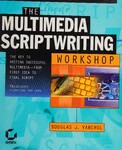Bandit LOAF
Long Live the Confederation!
Today's update is one of those 'under our noses the whole time' events! It turns out that Wing Commander III and IV co-writers Terry Borst and Frank De Palma actually wrote and spoke quite a bit about the game at the time. Both gave lectures and provided interviews for academic books relating to interactive storytelling... and we've found three fascinating ones that were published in the wake of Wing Commander IV that go into detail we've never seen before about the process behind scripting the game!
The first and most detailed is Chapter 10 of a book called The Multimedia Scriptwriting Workshop (Douglas J. Varchol, Sybex, 1996). The book spends a full 50 (!) pages walking through the development of Wing Commander IV's script, complete with screenshots and script extracts. Even more shocking is the fact that it was published in January 1996... some six weeks before Wing Commander IV even came out! If only we'd been reading screenwriting self help books as teenagers. The book also reproduces the games credits as an appendix which surely wasn't at all a move to fill space. You can download the chapter and appendix as a PDF here here.

Next up is a comprehensive 1996 interview with Terry Borst which appears in a similar book called Interactive Writer's Handbook, Second Edition (Carronade Group, Jon Samsel and Darryl Wimberley, 1996). The book also prints a script page from the game! You can download the chapter as a PDF here here.

Finally, there's one straight out of the most obscure depths of academia: Euphoria and Dystopia: The Banff New Media Institute Dialogues (Sarah Cook, Riverside Architectural Press / ABC Art Books Canada, 2020). It's a recent collection of archival material created over the past several decades for Canadian university Banff's media school. Of interest to us is a presentation about interactive media (and his experiences with Wing Commander) which was given by Mr. Borst in September 1998 as part of a lecture series called The Big Game Hunters (September 19-21, 1998). You can download the chapter as a PDF here here.

--
Original update published on December 11, 2022
The first and most detailed is Chapter 10 of a book called The Multimedia Scriptwriting Workshop (Douglas J. Varchol, Sybex, 1996). The book spends a full 50 (!) pages walking through the development of Wing Commander IV's script, complete with screenshots and script extracts. Even more shocking is the fact that it was published in January 1996... some six weeks before Wing Commander IV even came out! If only we'd been reading screenwriting self help books as teenagers. The book also reproduces the games credits as an appendix which surely wasn't at all a move to fill space. You can download the chapter and appendix as a PDF here here.

Next up is a comprehensive 1996 interview with Terry Borst which appears in a similar book called Interactive Writer's Handbook, Second Edition (Carronade Group, Jon Samsel and Darryl Wimberley, 1996). The book also prints a script page from the game! You can download the chapter as a PDF here here.

Finally, there's one straight out of the most obscure depths of academia: Euphoria and Dystopia: The Banff New Media Institute Dialogues (Sarah Cook, Riverside Architectural Press / ABC Art Books Canada, 2020). It's a recent collection of archival material created over the past several decades for Canadian university Banff's media school. Of interest to us is a presentation about interactive media (and his experiences with Wing Commander) which was given by Mr. Borst in September 1998 as part of a lecture series called The Big Game Hunters (September 19-21, 1998). You can download the chapter as a PDF here here.

--
Original update published on December 11, 2022
